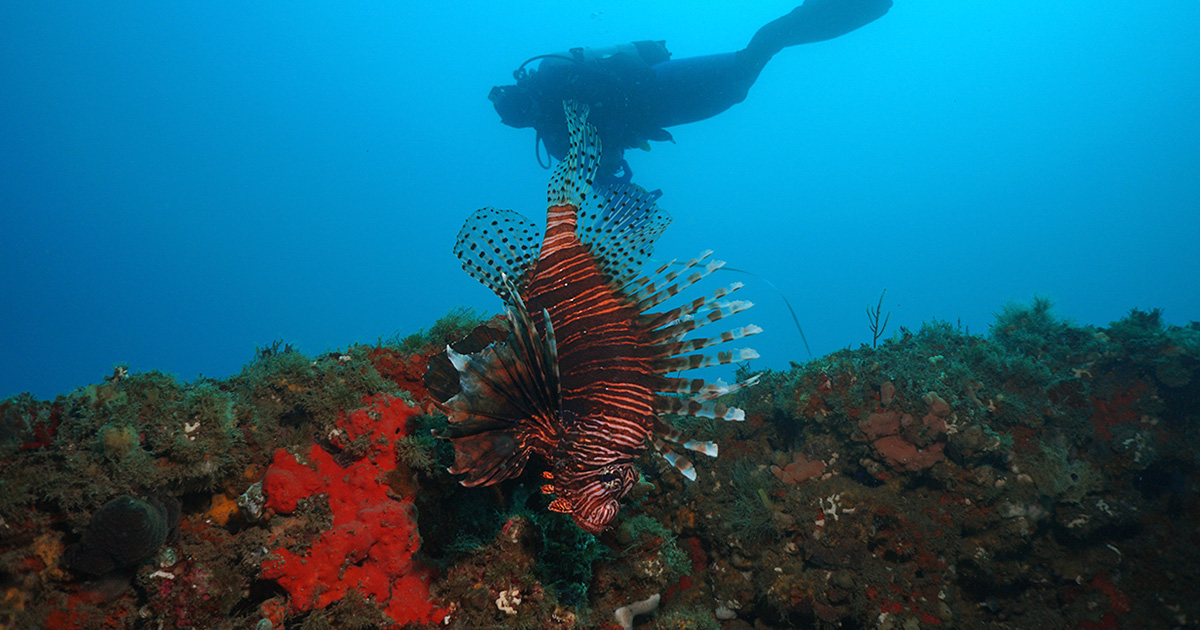theduckguru
Contributor
I doubt lion fish hunting makes a measureable impact on their population
Welcome to ScubaBoard, the world's largest scuba diving community. Registration is not required to read the forums, but we encourage you to join. Joining has its benefits and enables you to participate in the discussions.
Benefits of registering include
It has actually been studied by FWC/FWRI with many LF hunting tournaments showing no return LF growth for months after the tourney. But just like weeds, if you stop 'treatment', they will return.I doubt lion fish hunting makes a measureable impact on their population
In my experience in Belize, it wasn't just in the vicinity, it was following us, buzzing us continuously for most of the dive. Not a big deal as these were not an aggressive breed of shark. I wouldnt want bull or tiger sharks getting that close.Makes total sense. We always had a few reef sharks in the vicinity.
It has actually been studied by FWC/FWRI with many LF hunting tournaments showing no return LF growth for months after the tourney. But just like weeds, if you stop 'treatment', they will return.
On the subject of the card, I like it because it's brings awareness & interest to Newer divers who don't know about the invasion. The best way I get diver's interest when I'm on a charter boat is to NOT ONLY show them how easy it is to spear them, but since I catch so many, I usually send the people home with LF filets to cook. When I followup with the dive shop later, they say the people have already re-scheduled a return dive specifically to hunt. And then I've got another diver(s) recruited and posting pictures promoting LF hunting.
True, but that should be what you learn on that first chartered LF hunting trip. I seem to recall a section in my daughters' OW classes about hazardous marine life. It was general, but at least started to bring some awareness that there are things down there that you shouldn't touch.Actually, learning how NOT to get stung by a lionfish is probably good money spent and learning how to supply immediate first aid if/when you screw up is worth even more.
They are associating them with food, but aren't necessarily associating them as something they should hunt. May just be associating that those weird looking animals with all the bubbles often have treats.How can it make sense that the reef sharks aren’t learning to eat the lionfish and then say that the sharks are learning to associate divers with food?
That's a good point on the card bringing awareness. I hadn't considered that, though I'd imagine that some divers may stumble upon it, but probably won't pursue the card unless it's something that they are already aware of and interested in.On the subject of the card, I like it because it's brings awareness & interest to Newer divers who don't know about the invasion. The best way I get diver's interest when I'm on a charter boat is to NOT ONLY show them how easy it is to spear them, but since I catch so many, I usually send the people home with LF filets to cook. When I followup with the dive shop later, they say the people have already re-scheduled a return dive specifically to hunt. And then I've got another diver(s) recruited and posting pictures promoting LF hunting.
True. Without a doubt spearfishing does tend to get any nearby sharks interested. And generally, there are two schools of thought on what to do when the tax man does show up.I imagine swimming around with ANY fish on the end of spear with sharks present is like parading around a methadone clinic with a lollipop.
So far, all of the data indicates that this is an effective strategy.I doubt lion fish hunting makes a measureable impact on their population


Given that in Greece the sea has been overfished (and illegal fishing plagues the country), additional stresses on the remaining fish population is not good.So far, all of the data indicates that this is an effective strategy.

A new study outlines the do’s and don’ts of managing invasive lionfish - News
Scientists are applying lessons learned in the Atlantic to manage expansion of lionfish in the Mediterranean.blogs.ifas.ufl.edu
Lionfish Research - this article is about an on-going project in FGBNMS to study this very issue. I have been participating in it since 2015. Interestingly, we were not out for almost two years and the population had not grown that much in number, but the fish being removed were larger.

Effectiveness of removals of the invasive lionfish: how many dives are needed to deplete a reef?
Introduced Indo-Pacific red lionfish (Pterois volitans/miles) have spread throughout the greater Caribbean and are associated with a number of negative impacts on reef ecosystems. Human interventions, in the form of culling activities, are becoming common ...www.ncbi.nlm.nih.gov
